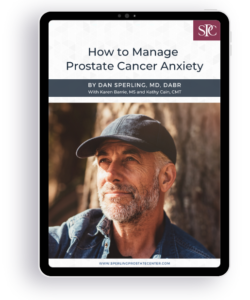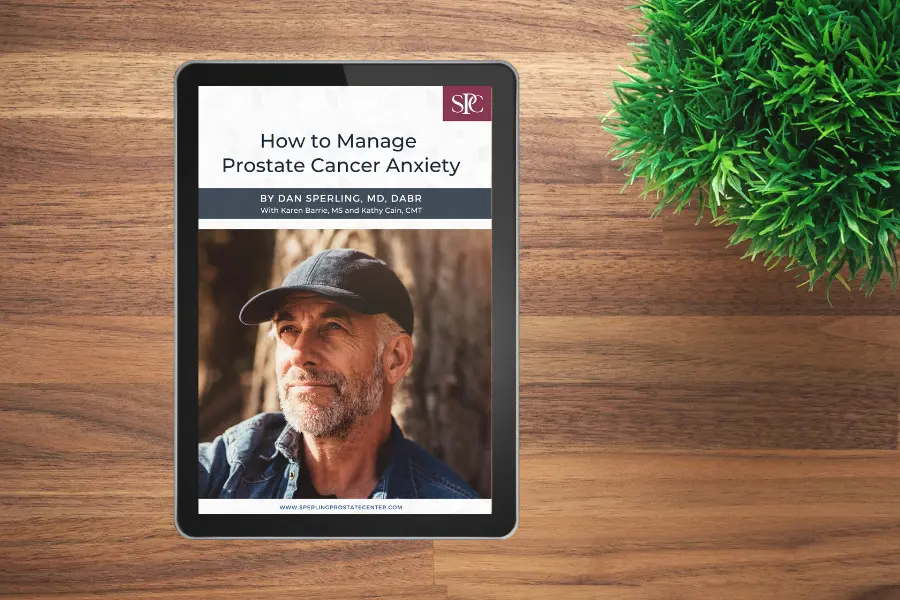Few things are more unsettling and stressful than a diagnosis of prostate cancer (PCa). It causes a state of anxiety. Each step of the journey sparks another wave of anxiety: suspicion, tests, diagnosis, choices, decisions, treatment, recovery, follow-up monitoring, and potential recurrence. These stressors trigger an immediate reaction: the fight-flight-freeze response. Most men can’t just flip a switch to let it go, but it can have negative consequences if it’s not well managed.
Anxiety causes an altered state, a lightning-quick surge of biochemicals and electrical nerve messages brilliantly designed to increase the odds of survival when faced by danger. In today’s world, the stressors of life catalyze it as powerfully as nature’s threats did for our remote ancestors. Whether the perceived threat is outside the body or inside the mind doesn’t matter. The body automatically goes into turbo, increasing its speed, strength, and resistance to sudden injury. Afterward, it can either taper off quickly, occur in repeated waves, or worst of all, become a low grade, lingering state of harmful overdrive.
Download Our Free Ebook: “How to Manage Prostate Cancer Anxiety”

Don’t let anxiety over prostate cancer run you. Instead, learn how you can take charge and empower yourself to manage stress and boost positive treatment outcomes with our “first aid kit” of practical tips and tools.
Can a state of stress and anxiety make PCa worse?
Anxiety is surprisingly common among prostate cancer patients. Patients sometimes ask us if their PCa was brought on by stress in their life. While no research has proven that stress or anxiety causes cancer to start, scientists have known for years that anxiety’s lingering cascade of neurotransmitters, hormones and other biological molecules can lead to a rise in PSA and even inflame existing PCa.
A 1999 paper reported that abnormal PSA, a signal of prostate disease, was three times higher for men with high levels of stress![i] An important study on stress and BPH (benign prostatic hyperplasia, a non malignant gland enlargement) concluded that “…stress conditions may be associated with the development or aggravation of prostatic disease.”[ii] A 2021 PCa paper by Bellinger, et al. describes a biological link between poor coping and worse PCa outcomes, suggesting that stress-triggered anxiety interacts with physiological stress responses in a way that can ramp up tumor activity.[iii] Thus, stress and anxiety set up an unfortunate loop: anxiety leads to rising PSA, and rising PSA fosters more anxiety.
Rising PSA and the cycle of anxiety
Psychologists recognize what’s called the cycle of anxiety, which has four stages:
- Stage 1 Feeling anxious and wanting to deal with it.
- Stage 2 Attempting to avoid the situation.
- Stage 3 Feeling a temporary sense of relief.
- Stage 4 Returning to a state of heightened anxiety.
It’s not unusual for men who are feeling generally stressed in their lives to avoid PSA blood tests to screen for PCa. Although the precise factors that influence this behavior have not been identified, it seems linked with how often they see their doctors; men who have only seen a doctor once have much lower rates of PSA screening than men who see their doctors annually.[iv] However, men who take anti anxiety medications are more likely to get screened than anxious men who do not medicate.[v]
The danger in skipping annual PSA blood tests is the increased odds of developing life-threatening PCa. The drop in PSA screening after it was downgraded in 2012 led to more cases of advanced PCa that were not detected sooner. Thus, a cycle of anxiety over PCa can lead to a sad outcome.
Let’s take an imaginary case. Mr. Bradbury is in a constant state of anxiety due to his high-pressure job. He starts rationalizing, skipping his annual physical and PSA test. He knows his dad died of PCa, but that’s just one more worry he’s too stressed to deal with. Six years down the road, he starts having migraines that finally bring him to the doctor, who runs a battery of blood tests. Mr. B is shocked that his PSA registers 17.5 ng/ml (for his age, 2-4 would be normal). When his doc orders a biopsy, Mr. B’s anxiety and stress go through the roof. He gains some relief by putting it off, but his doctor pushes for a repeat PSA in three months. However, as the Bellinger study suggests, his stress hormones may be fueling his suspected tumor’s growth and tendency to become more aggressive. When the next blood draw shows his PSA is at 18.2 ng/ml, the doctor recommends he at least go for a prostate MRI, which he again puts off. You can see where this is going. Mr. B is caught in a potentially deadly self-fulfilling prophecy, all because his anxiety was running him until it was out of control.
Managing PCa stress for better disease outcomes
PCa stress and anxiety can make matters worse, but it doesn’t have to be that way. There are three simple tools that really work to calm the turbo stress engine, using your own consciousness to counter the impact of those physiological changes. Dr. Sperling’s new e-booklet, How to Manage Prostate Cancer Anxiety offers three tools as a “first aid kit” when anxiety hits:
- Conscious breathing – an easy-to-learn technique called belly breathing takes control of your parasympathetic nervous system to turn off the flow from the stress faucet.
- Attitude – reframing negative ideas and fear into positive ones is powerful.
- Visualization – creating peaceful, restful images with your mind’s eye is an antidote to stressful circumstances.
Don’t let anxiety over prostate cancer start to run you. Instead, learn how you can take charge, and empower yourself to manage the stress that can erode your well-being if left to run its own course. Dr. Sperling created this practical antidote to PCa stress in response to the predicament of many patients. He recognizes that reducing anxiety is a self-empowering way to boost positive treatment outcomes.
You can download the e-book for free here. It contains detailed information and instructions. We hope you find it informative and helpful.
NOTE: This content is solely for purposes of information and does not substitute for diagnostic or medical advice. Talk to your doctor if you are experiencing pelvic pain, or have any other health concerns or questions of a personal medical nature.
References
[i] Stone AA, Mezzacappa ES, Donatone BA, Gonder M. Psychosocial stress and social support are associated with prostate-specific antigen in men: Results from a community screening program. Health Psychology. 1999;18:482– 486.
[ii] Ullrich PM, Lutgendorf SK, Kreder KJ. Physiologic reactivity to a laboratory stress task among men with benign prostatic hyperplasia. Urology. 2007 Sep;70(3):487-91; discussion 491-2.
[iii] Bellinger DL, Dulcich MS, Molinaro C, Gifford P et al. Psychosocial Stress and Age Influence Depression and Anxiety-Related Behavior, Drive Tumor Inflammatory Cytokines and Accelerate Prostate Cancer Growth in Mice. Front Oncol. 2021 Sep 16;11:703848.
[iv] Kotwal AA, Schumm P, Mohile SG, Dale W. The influence of stress, depression, and anxiety on PSA screening rates in a nationally representative sample. Med Care. 2012 Dec;50(12):1037-44.
[v] Ernst, Diana. “Anxiety, Depression Med Use Linked to Increased Odds of PSA Testing.” MPR First Report, Feb. 18, 2022. https://www.empr.com/home/mpr-first-report/asco-gu-2022/anxiety-depression-med-use-linked-to increased-odds-of-psa-testing-2/



